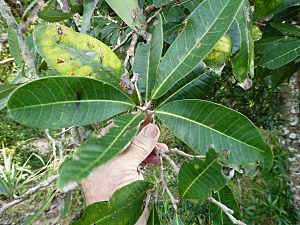Tar tree facts for kids
Quick facts for kids Tar tree |
|
|---|---|
 |
|
| Scientific classification |
|
| Kingdom: | Plantae |
| Clade: | Tracheophytes |
| Clade: | Angiosperms |
| Clade: | Eudicots |
| Clade: | Rosids |
| Order: | Sapindales |
| Family: | Anacardiaceae |
| Genus: | Semecarpus |
| Species: |
S. australiensis
|
| Binomial name | |
| Semecarpus australiensis |
|
| Script error: The function "autoWithCaption" does not exist. | |
Script error: No such module "Check for conflicting parameters".
The Tar tree (scientific name: Semecarpus australiensis) is a fascinating Australian tree. It's also known as the native cashew or cedar plum. This tree is related to the cashew nut that you might eat! It grows in special types of forests, often near the coast.
About the Tar Tree
Where It Grows
The Tar tree naturally grows in warm, wet places. You can find it in monsoon forests and rainforests. Monsoon forests are like rainforests but some trees lose their leaves in the dry season. It grows from sea level up to about 250 meters high. Often, you'll see it growing close to the ocean.
This tree is found in parts of Australia, including the Northern Territory, Cape York, and the Queensland wet tropics. It also grows on islands like the Torres Strait Islands, New Guinea, New Britain, and the Aru Islands.
Leaves, Flowers, and Fruit
The leaves of the Tar tree are quite large and have clear veins. They are dark green on top and a lighter green underneath. The tree produces small, cream-colored flowers.
After the flowers, unusual fruits appear. The seeds of the Tar tree are on the outside of the fruit. They are held in a tough, leathery pod. This pod is attached to a fleshy base that looks like a fruit and can be orange or red.
Special Uses
Aboriginal Australians have traditionally used the seeds of the Tar tree. However, the sap from the tree can be very irritating. Because of this, they take great care when preparing the seeds. They might even cover their hands with clay to protect their skin.
The seeds are roasted over a fire before they are eaten. Once cooked, they taste similar to regular cashew nuts.
Images for kids
 | William L. Dawson |
 | W. E. B. Du Bois |
 | Harry Belafonte |





